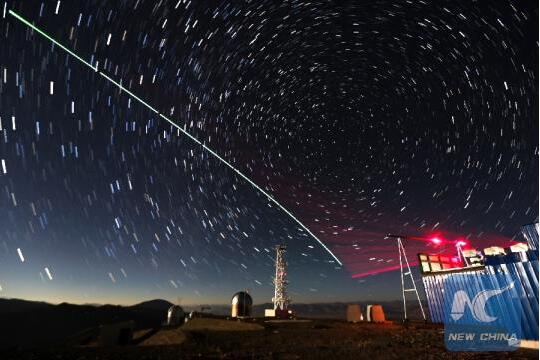
Newsroom

Composite photo taken on Dec 9, 2016 shows a satellite-to-earth link established between quantum satellite "Micius" and the quantum teleportation experiment platform in Ali, Southwest China's Tibet autonomous region. [Photo/Xinhua]
Pan Jianwei, a leading Chinese scientist who has been at the center of China's efforts to reach quantum supremacy since 2001, said the country was once "only a follower "in modern information science.
But thanks to hard work and breakthroughs, China now has "a chance to be a leader", Pan, 48, a leading quantum information scientist and a member of the Chinese Academy of Sciences, remarked in a profile published in MIT Technology Review.
Pan, a member of the Chinese Academy of Sciences, began putting together a quantum information research team in 2001 at the University of Science and Technology of China in Hefei, Anhui province.
Quantum mechanics is defined as the body of scientific laws regarding nature at the smallest scales - the energy levels of atoms and subatomic particles.
During the Mozi Forum, an academic forum this spring in Hefei, Pan spoke about breakthroughs in the field. These included the revelation that his team plans to build a prototype quantum computer no larger than a laptop, but whose computing capability could surpass the world's most powerful supercomputer in three to five years.
President Xi Jinping said during an inspection visit to Hefei in April 2016 that Pan's field of study held much promise and was of great importance.
At the Hefei university's Institute of Advanced Technology, where the control center is based for the 2,000-kilometer Beijing-Shanghai quantum communication trunk line, Xi said China must strengthen its own innovation capability while continuing to open up.
The quantum communication-trunk line began operating in 2016, shortly after China's - and the world's - first satellite for quantum experiments was launched.
Pan led the design and construction efforts of both the trunk line and the satellite.
At the recent academic forum, Pan talked about the challenges and breakthroughs in the satellite and quantum computer projects.
"We have already conducted successful experiments of quantum communication between Beijing and Vienna, and are now cooperating with scientists from Italy, Singapore, Germany, Russia and Sweden with our satellite," Pan said.
"At first, the quantum experiential satellite had a problem - it would only work at night. But so far we have solved it well, enabling it to work throughout the day.
"The breakthrough," he added, "has laid the foundation for building a network of more satellites in the future."
Pan also noted that his team revealed a prototype quantum computer in 2017 that could manipulate 10 quantum bits, or qubits, for data storage and calculations.
Last year, the team increased the capacity to 18 qubits. When the capacity reaches between 20 and 30 qubits, the computer's calculation capacity could match a popular commercial laptop - a goal that will be reached soon, Pan said.
"We aim to raise the number to 40 to 50 in three to five years. Then the calculation capacity will surpass any one of the world's most powerful supercomputers, while its size will be no larger than a laptop," Pan said at the forum.
Conventional computers can only store data in 1 or 0 binary bits. Qubits, on the other hand, are subatomic particles that can be both 1 and 0 at the same time, holding exponentially more information.
Pan's 34-member team of physicists has published at least eight papers in the leading science journals Nature and Science in the past three years, according to USTC.
Pan, in an interview during this year's two sessions, the annual meetings of China's top legislative and political advisory bodies, said: "Challenges remain for future development in the field, considering the increasingly fierce competition in the world. Further breakthroughs will require more interdisciplinary collaboration."
He has proposed building a national laboratory in the Hefei National High-Tech Industry Development Zone for quantum information science and technology. Construction of a lab has nearly been completed on a 330-hectare area in the Hefei zone.
"Applying new technology and perfecting it in experiments will at last result in new perspectives for fundamental scientific research," Pan told the forum in Hefei. (China Daily)
